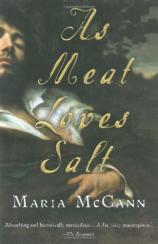Reading Group Guide
Discussion Questions
As Meat Loves Salt

1. What is the nature of the Voice that speaks to Jason? How does it change over the course of the novel? Is Jason schizophrenic, or is the Voice just an expression of his rage? Jacob thinks of the Voice in theological terms; he says that he is possessed, and his fellow soldiers call him a "Bad Angel." What is the significance of this religious element?
2. The novel has been praised for its historical accuracy and period detail. Which everyday elements of seventeenth-century life were most surprising or interesting to you? To what extent is Jacob's story a universal one, and to what extent is it defined by the period?
3. The English Revolution was in large part a religious conflict. What role does religion play in the lives of Jacob's fellow soldiers? In the lives of the other characters? How does morality relate to religion in the novel? Whom do you consider the most moral characters? Why is Ferris an Atheist? How does his repudiation of religion relate to his plans for the Commonwealth?
4. Do you think Jacob and Ferris would define themselves as homosexuals, if such a term had existed in their era? Discuss the concept of homosexual sex as a sinful act, as opposed to a marker of the men's identity-for example, see the quote from Leviticus that Jacob reads (and imagines Nathan and Ferris having read) on p. 376: "If a man also lie with mankind, as he lieth with a woman, both of them have committed an abomination: they shall surely be put to death.". Is it significant that this refers to an act rather than a type of person or a state of being.
5. How does McCann weave the themes of the folktale that opens the novel into Jacob's story? How do the self-inflicted loss and regret of the King who banishes his daughter relate to the patterns of Jacob's life?
6. How important is the fact that Jacob was born to free, landholding parents to his view of the world and the course of his life? How does his time as a servant affect his attitudes once he is free, for example during the planning stages of Ferris's Commonwealth?
7. Who would you say has the position of power in Jacob and Ferris's relationship? What do they see in one another? Would you describe Jacob as passive? Do you recognize any elements of their relationship from your own experience or observations of others?
8. Compare the two rape scenes, when Jacob forces himself on Caro and on Ferris. What happens to Jacob in each case? What sparks his anger? Rape is generally considered to be more a crime of violence and power, not sex; would you say that is the case here?
9. How does the glass inscribed "Loyaute" that Jacob loots from Basing and gives to Ferris work as a symbol? Why does Ferris give it back to Jacob? Why does Jacob throw it away at the end of the book?
10. How has the death of Ferris's wife affected him? Is it related to his atheism? Is it a cause or a product of his idealism?
11. McCann does not reveal Jacob's guilt in the murder of Christopher right away, just as she gradually unfolds Jacob and Ferris's sexual attraction to one another. Did you anticipate these secrets? Do you think McCann's concealing them from the reader is important to the flow of the novel?
12. After reading Psalm 115, which had been cited by Cromwell in his address to the troops before the assault on Basing, Jacob reflects on its meaning, "We were to leave them like unto their idols, utterly unable to see, hear, smell, touch, walk," and then thinks, "I knew what it was to send a soul down into silence." (157) Is there a difference between the righteous bloodlust Cromwell is trying to stir in his troops and Jacob's sudden fits of rage? What does Ferris mean when he tells Jacob, "The army is bad for you."? (179)
13. After listening to Ferris read a pamphlet calling for liberty and equality for all men, Jacob remarks, "it is a curious thing to be reading such matter as this and have a woman serve us. The last time I read such things I was a servant myself, and now I have one." (238). What do you think about the conversation that follows? Read the community rules Ferris reads on p. 316. How are they different from the principles by which we live today? Do you think that Ferris's notion of a colony of men and women living like brothers and sisters, and holding all property in common, is possible, or is Jacob right in his skepticism?
14. Is Sister Jane actually Caro? If she is, why does she pretend not to know Jacob when he confronts her?
15. After Jacob has found Ferris and Caro having sex in the wood, the chapter closes what seems to be a kind of parable: "There was once a man who heard his wife and her lover together. He heard the secret things the wife whispered to the lover, and said only, 'yes, that is she.'But then the lover pleaded to be touched, and the husband clenched his fists; and when the man cried aloud then the husband's nails cut deep into the palms of his hands." (506). Why does McCann have Jacob shift into the third person voice here? What is she trying to express in this passage?
16. How has Jacob changed at the end of the book? Is he completely responsible for the tragedies of his life? Did you empathize with him throughout the book? What do you imagine will become of him? Do you think he will be able to make a fresh start in Massachusetts?
As Meat Loves Salt
- Publication Date: January 7, 2003
- Paperback: 565 pages
- Publisher: Harvest Books
- ISBN-10: 015601226X
- ISBN-13: 9780156012263








